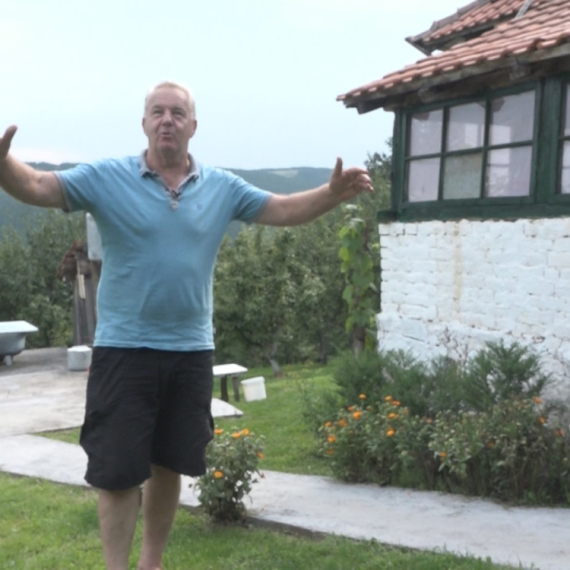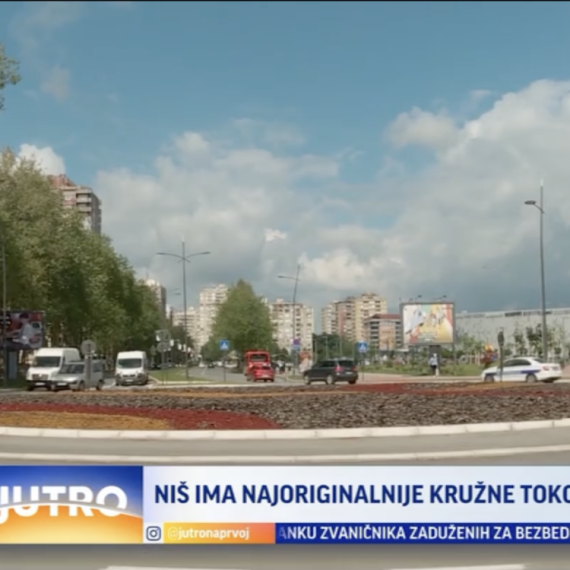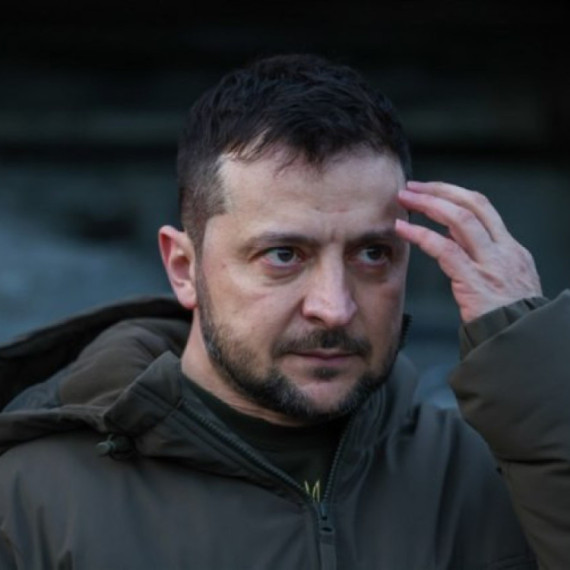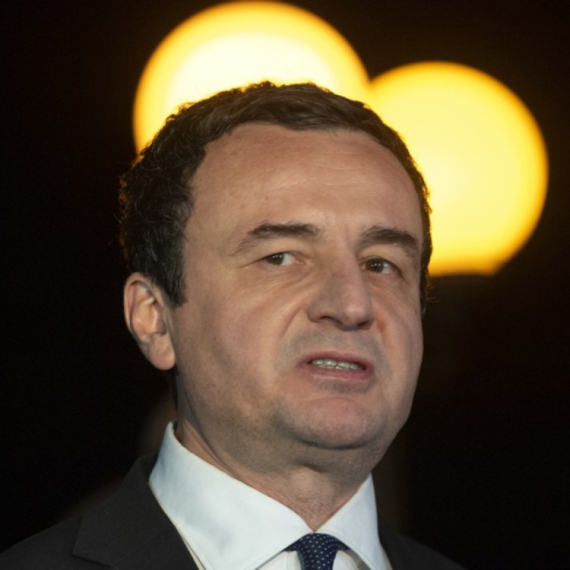WikiLeaks: Tadić advisor meets with U.S. ambassador
The latest batch of U.S. diplomatic cables published by WikiLeaks contains one sent this year by the U.S. envoy in Belgrade.
Thursday, 09.12.2010.
23:26

The latest batch of U.S. diplomatic cables published by WikiLeaks contains one sent this year by the U.S. envoy in Belgrade. Ambassador Mary Warlick reports about her February 3, 2010 conversation with President Boris Tadic's foreign policy advisor Jovan Ratkovic. WikiLeaks: Tadic advisor meets with U.S. ambassador Ahead of his trip to Washington, Ratkovic "detailed his plans to discuss possible ways forward on Kosovo," that would include "discreet brainstorming" with U.S. State Department and Congress officials, saying that Serbia sought a "realistic, pragmatic, peaceful, win-win solution for Serbs and Albanians". "He expressed concern that the International Civilian Office (ICO) plan to integrate northern Kosovo could destabilize the situation and threaten political stability in Serbia, and would not engage on the issue of whether Serbia would seek an UNGA resolution calling for new status talks," said the cable. "He stressed that the Serbian government wanted the U.S. to be part of and support a solution that would lead to regional stability and reconciliation. For that reason, he hoped for high-level, free-thinking, and informal discussions in Washington; he had received explicit guidance from President Tadic on the specifics of his message, but was not at liberty to share it yet," the report from Belgrade said. According to the cable, Ratkovic also stressed "the sensitivity of how the (predominantly Serb) north is handled". "Ratkovic argued that the northern part of Kosovo had a history distinct from the rest of the province, claiming that the three districts north of the Ibar were only annexed to the province after World War II to counter-balance the rapid growth of the ethnic Albanian population". "These people have never lived with Albanians, have never felt themselves part of Kosovo, and won't accept rule by Pristina," the U.S. ambassador quoted Ratkovic as saying. "Belgrade is not trying to change the reality on the ground for Kosovar Albanians, but changing the reality for Kosovo Serbs would also be destabilizing," Ratkovic said, according to the cable, which adds that the Tadic advisor referred to the ICO proposal "to integrate the north put forward by Peter Feith and supported by the United States was as 'not helpful'," and also "claimed that military intervention was being discussed". "He said that this was the primary reason that Tadic decided to address the UN Security Council on January 22: the implementation of such a strategy could result in instability and thus become a national security concern for Serbia, threatening the country's democratization and pro-Western orientation," said the cable. The U.S. ambassador wrote to Washington that her response was that Feith's ideas "were not new", and that there was "no discussion of the use of force to impose the integration of the whole territory of Kosovo". As for Tadic's views on NATO, his advisor said that he "believes that Serbia cannot remain outside of NATO forever, but doesn't say this often because of the political sensitivity of the issue". "Serbia is taking concrete steps to increase its engagement with NATO. (...) Ratkovic emphasized that NATO's image in the Serbian public had a significant influence on the development of the relationship, mentioning the role of KFOR in protecting Kosovo Serbs and religious sites and concerns about its drawdown," reads the cable. Ratkovic was also quoted as expressed pessimism about prospects for constitutional reform in Bosnia-Herzegovina, and reiterated that the Serbian government supported the territorial integrity of that country, "and would not be swayed by what he claimed was the desire of the majority of Republika Srpska residents to secede and merge with Serbia". "Serbia is more worried about Macedonia's future than Bosnia's. It is not clear how a country composed of two completely different ethnic groups with no common language or religion can hold together, particularly with the ethnic Albanian population growing at such as rate that it will equal the Slavic population in 20 years. Ratkovic said that President Tadic was talking to both Greece and Macedonia about the name issue in hopes of unblocking Macedonia's path to both the EU and NATO," said the cable. "Kosovo; Option B: Partition; Option C: Serbia chooses between Kosovo or the EU. Option A (i.e, finding a way to define Serbia's special interests in the north and with the status of some churches in the south) most likely reflects the ideas that Belgrade is most interested in exploring. While Serbia's lack of a commitment to recognize Kosovo will remain an EU stumbling in the long-term, Ratkovic's overture next week may provide an initial first step toward defining a more realistic modus vivendi, which we have been encouraging the Serbs to explore," the U.S. Ambassador to Belgrade concludes her report. (Beta/AP) "Stop the rot" The Guardian reports on its website that in a separate meeting with EU foreign policy chief Catherine Ashton's adviser, Ratkovic also spoke about a scenario that would lead to a partition of Kosovo. Ratkovic was quoted as saying that "while Belgrade would need to accept that it would not govern Kosovo again, Kosovo would have to come to the realization that it would not effectively be able to extend its governance north of the Ibar River". Meanwhile in Pristina, U.S. Ambassador Chirstopher Dell writes back to Washington this year that "failure to act soon means losing northern Kosovo and will reopen the Pandora's box of ethnic conflict that defined the 1990s." "The time is right to end the years of drift on the north and to alter the dynamic of a hardening partition between the north and the rest of Kosovo… The current situation is untenable and deteriorating. The aim is to stop the rot."
WikiLeaks: Tadić advisor meets with U.S. ambassador
Ahead of his trip to Washington, Ratković "detailed his plans to discuss possible ways forward on Kosovo," that would include "discreet brainstorming" with U.S. State Department and Congress officials, saying that Serbia sought a "realistic, pragmatic, peaceful, win-win solution for Serbs and Albanians"."He expressed concern that the International Civilian Office (ICO) plan to integrate northern Kosovo could destabilize the situation and threaten political stability in Serbia, and would not engage on the issue of whether Serbia would seek an UNGA resolution calling for new status talks," said the cable.
"He stressed that the Serbian government wanted the U.S. to be part of and support a solution that would lead to regional stability and reconciliation. For that reason, he hoped for high-level, free-thinking, and informal discussions in Washington; he had received explicit guidance from President Tadić on the specifics of his message, but was not at liberty to share it yet," the report from Belgrade said.
According to the cable, Ratković also stressed "the sensitivity of how the (predominantly Serb) north is handled".
"Ratković argued that the northern part of Kosovo had a history distinct from the rest of the province, claiming that the three districts north of the Ibar were only annexed to the province after World War II to counter-balance the rapid growth of the ethnic Albanian population".
"These people have never lived with Albanians, have never felt themselves part of Kosovo, and won't accept rule by Priština," the U.S. ambassador quoted Ratković as saying.
"Belgrade is not trying to change the reality on the ground for Kosovar Albanians, but changing the reality for Kosovo Serbs would also be destabilizing," Ratković said, according to the cable, which adds that the Tadić advisor referred to the ICO proposal "to integrate the north put forward by Peter Feith and supported by the United States was as 'not helpful'," and also "claimed that military intervention was being discussed".
"He said that this was the primary reason that Tadić decided to address the UN Security Council on January 22: the implementation of such a strategy could result in instability and thus become a national security concern for Serbia, threatening the country's democratization and pro-Western orientation," said the cable.
The U.S. ambassador wrote to Washington that her response was that Feith's ideas "were not new", and that there was "no discussion of the use of force to impose the integration of the whole territory of Kosovo".
As for Tadić's views on NATO, his advisor said that he "believes that Serbia cannot remain outside of NATO forever, but doesn't say this often because of the political sensitivity of the issue".
"Serbia is taking concrete steps to increase its engagement with NATO. (...) Ratković emphasized that NATO's image in the Serbian public had a significant influence on the development of the relationship, mentioning the role of KFOR in protecting Kosovo Serbs and religious sites and concerns about its drawdown," reads the cable.
Ratković was also quoted as expressed pessimism about prospects for constitutional reform in Bosnia-Herzegovina, and reiterated that the Serbian government supported the territorial integrity of that country, "and would not be swayed by what he claimed was the desire of the majority of Republika Srpska residents to secede and merge with Serbia".
"Serbia is more worried about Macedonia's future than Bosnia's. It is not clear how a country composed of two completely different ethnic groups with no common language or religion can hold together, particularly with the ethnic Albanian population growing at such as rate that it will equal the Slavic population in 20 years. Ratković said that President Tadić was talking to both Greece and Macedonia about the name issue in hopes of unblocking Macedonia's path to both the EU and NATO," said the cable.
"Kosovo; Option B: Partition; Option C: Serbia chooses between Kosovo or the EU. Option A (i.e, finding a way to define Serbia's special interests in the north and with the status of some churches in the south) most likely reflects the ideas that Belgrade is most interested in exploring. While Serbia's lack of a commitment to recognize Kosovo will remain an EU stumbling in the long-term, Ratković's overture next week may provide an initial first step toward defining a more realistic modus vivendi, which we have been encouraging the Serbs to explore," the U.S. Ambassador to Belgrade concludes her report.
"Stop the rot"
The Guardian reports on its website that in a separate meeting with EU foreign policy chief Catherine Ashton's adviser, Ratković also spoke about a scenario that would lead to a partition of Kosovo.Ratković was quoted as saying that "while Belgrade would need to accept that it would not govern Kosovo again, Kosovo would have to come to the realization that it would not effectively be able to extend its governance north of the Ibar River".
Meanwhile in Priština, U.S. Ambassador Chirstopher Dell writes back to Washington this year that "failure to act soon means losing northern Kosovo and will reopen the Pandora's box of ethnic conflict that defined the 1990s."
"The time is right to end the years of drift on the north and to alter the dynamic of a hardening partition between the north and the rest of Kosovo… The current situation is untenable and deteriorating. The aim is to stop the rot."


























































Komentari 10
Pogledaj komentare